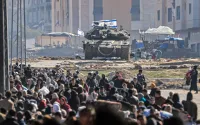18 March 2003Anthony Barnett
The United States is preparing a war designed to unleash an unparalleled concentration of force to impose regime change on Iraq.
Around the world a profound public scepticism has generated widespread opposition with unprecedented speed.
The world’s diplomats, caught between America’s will to war and global opposition, are involved in extraordinary disputes.
In Iraq, a cowed population awaits the end of one of the world’s most vicious tyrannies. Welcome to the 21st century.
The most exceptional of all the extraordinary processes now unfolding is the emergence of what can be called ‘world opinion’. White House policy has given birth to a new force of influence on international affairs, one distinct from the traditional role of nations and their public opinion, which have hitherto defined and monopolised diplomacy and war. It is emerging both as a truly global force and as the most significant opponent of America’s leadership. World opinion is becoming a second superpower.
It is ‘super’ in the literal sense of being ‘above’ the power of normal states, and able to bend and shape their conduct; power without a time-honoured centre or a conventional leadership. More, it is an internet-connected expression of a new form of democracy, one that takes a particular expression in each nation and yet links beyond them.
World opinion is not incapable of error. Nor is it inherently superior to what has gone before. On the contrary, only if it shakes off an already evident gloss of self-congratulation and triumphalism, will it escape the stupidities that have so far marked power through all time.
Moreover, the force of ‘world opinion’ needs to be distinguished from the current, enormous wave of protests and demonstrations around the world. There are public movements which feed into it, and grow from it. But they are only the partial, organised expression of what is still a new and uncertain power – one that crucially includes (a point I will return to) an enormous section of American opinion.
The nature of world opinion
World opinion is a product of the end of the cold war. It made its first appearance by bringing about the ending of apartheid in South Africa. A second example of its capacity to shape affairs was the campaign against landmines that so took the rulers of the world by surprise. A third is the demand to write off the debt of the poorest nations, which still continues.
Both the struggle against apartheid and the campaign against landmines were quite tightly led – but they then expanded rapidly. World opinion has so far shown an admirable indifference to the sectarianism of those who head its great causes.
(It is impossible to resist noting that when, as part of the growing campaign to bring democracy to South Africa, the US Senate expressed its view on whether Nelson Mandela should be released, then Senator and now Vice-President Dick Cheney was one of the few who voted to keep him in prison. A good example, it seems, of his distinctive feel for the long-term interests of America.)
How does world opinion make its power and influence felt? Not, of course, through military confrontation. A defining characteristic is its non-violence (violence is clear evidence of attempts to hijack and discredit its profoundly reformist instincts). It pressures its authority through many capillaries of influence – economic, cultural, social and electoral.
The White House appears to think that it can both spend billions of dollars on the overthrow of Saddam and, at the same time (as Elizabeth Becker reports for the New York Times), “single-handedly block an agreement to provide medicines to the world’s poorest nations.” The latter action is causing consternation in the World Trade Organisation (WTO), supposedly a bastion of American hegemony over world trade. Each example of such discrepancies – and there are many – breaks the belief of one individual or another. Loyal people who have always played the game and looked to their pension, suddenly have their moment of clarity. This, they decide, is insupportable. Institutions then start to rebel; the expected ceases to happen.
Protests and demonstrations, by contrast, take place outside the systems of power. They try to make themselves heard ‘through’ the media, to influence and shape policy. The movement for global justice, for example, with its demonstrations from Seattle to Genoa and its Social Forums, is seeking to influence world opinion and policy.
But world opinion is not ‘a movement’. It cuts right across party loyalties. It is a public space within which everyone – media workers as much as students, bureaucrats as well as housewives – can make up their mind. I am describing something new, still unformed and open: how will it balance emotion or reason? Can it sustain itself? Is it really beyond fashion and the moods of the mob? Is there just one world opinion? These are obvious as well as urgent questions. In principle, they could be met by closing down rather than opening up further discussion, as the required number of opinion polls and academic conferences have been conducted to ensure that the subject is now sterile and can be safely dissected.
What is essential, rather, is not to prejudge the nature of world opinion, but to explore it: first, by looking at the way that, with respect to Iraq, it seems actually to have changed global politics and influenced outcomes, especially in Europe; and, secondly, by examining the way it is being partially expressed in demonstrations.
My aim is to stimulate some discussion on what seems to me to be a living force which is altering politics globally and nationally. There are two clear aspects to its character as it has emerged since the cold war.
It is human. It shares vulnerability. This aspect of world opinion emerged strongly in response to 9/11.
It is not unintelligent and it is certainly not deferential. It will judge leaders fairly but it will certainly not be taken for granted. It is this aspect which has emerged with astonishing vigour in the approach to the imminent war with Iraq.
The actual influence of world opinion
The actual influence of world opinion with respect to the Iraq crisis can be registered. This began when the German Chancellor, Gerhard Schröder, learnt that by expressing opposition to German participation in a war on Iraq, his popularity grew. It proved a key factor in helping him come from behind to win a very close election. The outcome breached the rules of the cold war, when no left-wing party running on a ticket that could be construed as opposed to American global policy ever won an election (Charles de Gaulle did so in France – but from the right).
Why did Schröder do it? An answer lies in his visit to President Bush in February 2002 as a Chancellor who had persuaded his country to send troops to Afghanistan in support of Operation Enduring Freedom, the first time German forces had gone into action outside Europe since 1945. He had expended a great political cost and effort to achieve this.
It seems that Schröder asked his American counterpart about a possible coalition Iraq strategy and put three questions to him about military action there. If they went in, what were the plans for getting out? How would it help the war against terror – what were the connections between Saddam Hussein and al-Qaida? And how would they ensure the operation was legal in international law as the German constitution required?
It seems he got no reply. Not even a short call saying, “Sorry Gerhard, I understand your concerns but please see it my way.” Instead, the US started to talk about regime change. The German Chancellor reacted as many do when they are told they are not wanted. In that case, he responded, I don’t want to be part of it. Perhaps he might have been persuaded. Instead, he discovered that his reaction was warmly welcomed by large sections of German public opinion. He had come home – and a breach had been made in the world order.
For Schröder’s example opened up new possibilities. Everyone said he was wrong to have boxed himself into a fixed position by saying that, even with a full United Nations (UN) resolution, German troops would not participate in an attack on Iraq. Perhaps so; but it gave France the opportunity to tie Germany to a joint position in Europe and this drew President Chirac towards the position of refusing an immediate war.
Throughout the last few months, every well-known voice of experience expressed certainty that France was ‘being cynical’ and would back the US and participate in the spoils of Iraq when it came to a vote in the UN. Now the rage of Anglo-Saxon diplomats is unspeakable: France is not being cynical enough!
Yet, within weeks, its German-inspired policy has delivered better relations with Algeria and new interests and opportunities beckon. Chirac ‘came home’ as, much to everyone’s surprise, the crook has abandoned his holdings in Iraq.
It was not a protest movement which drove the two European leaders to their different defiance of America. It was the magnetic force of an extensive world opinion that exists in different ways in different places, which they found themselves giving voice to in their countries. They began to represent it. They discovered the energy and popularity which it generated. This then started to hold them to it.
It is important to distinguish the popularity of their policy of resistance to the American will for war on Iraq from their own personal standing and their domestic policies. What I am calling ‘world opinion’ draws on a taproot that goes deeper than partisan campaigns. Worldwide in its sweep, it ignores the boundaries of traditional allegiance.
Spain, Britain, Turkey
This can be illustrated by what has happened in the two European countries whose leaders met President Bush in the Azores to plot the final steps to war: Spain and my own country, Britain.
By some counts Spanish opposition to war in Iraq, drawing upon both right and left of the political spectrum, is over 90 per cent. In Barcelona, a city of 1.5 million, nearly a million poured on to its streets on 15 February. The only recent manifestations in Spain that can compare in terms of scale and composition were the immense crowds that demonstrated against ETA and its campaign of assassination.
Then too, non-political ‘ordinary’ people felt the need to say ‘no’. Both manifestations became expressions of a national kind, proclaiming their support for a civic as opposed to a violent way of conducting public life in a society still close to fascism.
The immense turn out in London on 15 February was akin to this. The conservative Mail on Sunday headlined its front-page report with the claim that 1.5 million had demonstrated and declared: “Britain has found its voice and leads the world towards peace.” Leave aside the pimply imperial pretension that scars London journalism, the Mail knows its readership. It smelt the patriotic flavour of the vast assembly, which was three times bigger than Britain’s previously largest political demonstration.
With its racially-mixed middle England composition, the crowd was closer to the turnout for Princess Diana’s funeral than to any political campaign. Both Spain and England witnessed a new kind of expression of opinion about foreign policy. It was not represented by the nation’s political leadership as in Germany and France, and so it poured out on to the streets to make itself known. The case of Turkey seems to fall between Germany and France, on the one hand, and the United Kingdom and Spain on the other. Under popular pressure, a newly elected right-wing parliament voted with its feet to deprive the US military of its expected northern front. Call it national pride. Call it solidarity with another Muslim country, however appalling the latter’s dictatorship. Call it democracy. The vote was especially hard for the White House to swallow just after it had declared that it was committed to introduce parliamentary government in Iraq.
Then Turkey’s military leader gave the parliament a severe ticking-off and told it to support its US allies. None the less, we can now speak of democracy in Turkey with greater respect. And Anglo–Hispanic-sized demonstrations can be expected if the war is protracted and the Turkish government supports US attacks.
Tony Blair, acutely aware of opinion and vulnerable to growing opposition in his own Labour Party addressed what he holds to be the central issues in a well-crafted statement to the British parliament on 25 February.
Blair spelt out the long record of UN resolutions seeking to deprive Saddam Hussein of weapons of mass destruction, and the evasive actions with which he has responded. He rejected the French, German and Russian memorandum calling for more time. “The issue is not time,” Blair emphasised, “it is will.” With these short words he summed up the argument developed especially by Phillip Bobbitt. The existence of such weapons demands an anticipatory strategy rather than the reactive one that has so far guided the principles of just war.
Blair, summing up, drew Parliament’s attention to the mind-wrenching costs of Saddam’s regime for Iraqis and the importance of a Middle East settlement for a wider peace. He ended with the following call: “That is why over the coming weeks we will work every last minute we can to reunite the international community and disarm Iraq through the UN. It is our desire and our hope that this can be done.” It was all very convincing but also strange. Why, I asked myself, did Blair’s consistency and logic fail to convince? Then I realised that something was missing: throughout his eloquent call to war the word ‘America’ had not been mentioned once. This gave the game away.
The expected phrases should have come naturally: “Our great and patient ally that has striven under duress to make a peaceful outcome possible”; “The admirable reluctance of a great power to use its might only as a last resort”; “the skill and dedication of the White House as it seeks a UN mandate”. To think about what the British prime minister would doubtless have liked to say confirms that even Tony Blair cannot find any words to praise US diplomacy or salute the US President, for fear that his own credibility will collapse.
It is this – not Blair’s policy but America’s – that most sentiment and judgement around the world rejects. Not the good war that may need to be fought to bring down a dangerous dictator, but a bad war that seeks such intervention as a stepping stone to a larger domination: a war which promises to continue to exploit the Iraqi people for its own purposes just as America did when it supported Saddam against Iran. A global contest has begun between the way the White House (not Tony Blair) seeks to conduct world affairs, and popular refusal around the world to accept such treatment. It is not the use of force that people have rejected, but its misuse. Not the outcome in Iraq, where a quick and relatively ‘clean’ outcome is to be hoped for, whatever your view of the likelihood of achieving this, but the strategy for imposing it now: the selection of priorities, the timing and its linkage to a war against evil that promises more of the same to come with targets selected unaccountably by members of George W. Bush’s cabinet.
This is why the popular opposition to the war will not be proved wrong, as Bush and Blair presume it will be, if the two leaders get to Baghdad with relatively little human cost to be welcomed there as liberators. For America’s capacity to act without legal restraint is not in doubt, nor is its ability to avoid human casualties if it so wishes. The question the world is asking is to what larger ends will such power be used? Thus, success in Iraq will – and should – pose the question: is Palestine next, or Iran? Will the White House follow Sharon’s strategy and escalate further against the ‘axis of evil’, or will it deliver (as victory over Saddam will confirm that it can) justice and a state to Palestine free of illegal settlements, along with peace and security to Israel, as well as democracy to Iraq?
Critics, including realist critics of the White House Iraq strategy, have always said the problem is not getting in but getting out: not winning but what to do with the victory. The easier Bush wins, the more the parallel superpower of world opinion will insist that the President delivers on democracy and a Middle East peace.
As a contributor to the openDemocracy ‘Iraq: War or Not?’ forum put it, “the US seems to be launching into a policy that is a war without end. That crosses border and cultures and targets particular religions and ways of life. Perhaps someone needs to explain to them that this is why everyone is so uneasy.”
From 9/11 to 3/16
Most people in the world desire a successful outcome in Iraq. It does not follow that they support the way the White House seeks to rule the roost. In this respect there is a clear contrast between what I am calling ‘world opinion’ and some of the organisers of the anti-war coalitions.
The ‘pre-emptive’ demonstrations against the Iraq war are another angle into exploring the nature and possible shape of ‘world opinion’. History was made on 15 February 2003. It saw the largest combined political demonstration on a single day ever. In hundreds of cities, many millions of people gathered and marched in a coordinated protest against the prospect of a US pre-emptive war. A month later, on 16 March, at much shorter notice a global vigil was organised even faster via the website of www.MoveOn.org.
On 9/11, people around the world watched with horror as the twin towers collapsed. They immediately recognised that something new had happened. Seventeen months later, the demonstrations of 2/15 occupied a different space in the collective consciousness. They were perceived locally not globally, and each became relatively marginalised. There was, there could not be, any such instant recognition of a turning point. Yet that is what they were.
To generate awareness of this, the candle vigil of 3/16 was conceived as a global image. Within days over 6,000 vigils were summoned up often in the most unlikely of places. Each vigil was pictured. Each gathering of candles symbolised the multitude of gatherings elsewhere.
When we look at the night sky we know that the Milky Way is our galaxy and every faint spot a sun like our own while other brighter stars are in fact entire galaxies of thousands of suns. In a similar way, each single candle, photographed and web-cammed, stood for a cluster of candles, every flame another vigil, the entire vigil a new kind of night sky.
To take a measure of the possible dynamic that has been released, a comparison cannot be avoided. After 9/11, millions turned out to pay their respects to the dead, to New York, to the US, and to express their revulsion at the indiscriminate terrorist attack on the World Trade Center. Le Monde, France’s foremost newspaper, blazoned ‘We are all Americans’ on its front page. The same sentiment filled the hearts of most of those who, a year and a half later, lit a candle on Sunday 16 March.
The tragedy for America is that in the eighteen months from 9/11 to 3/16 the Bush administration did not just throw away worldwide support and sympathy. It achieved something much harder: it turned support into opposition. Not only outside the US. Not only did the demonstrations display the sexually explicit slogans and images characteristic of post-Clinton politics, the protests stretched across all time zones around the planet and traced a path within as much as outside of America.
On 16 March, the tone was different. The candle vigils became, in effect, a memorial service: the sombre moment of contained anger in the face of violence. It seems absolutely right that the idea for the vigils started in the US itself and used American software to light its way from country to country and town to town.
World opinion, itself much larger than the thousands of vigils, includes Americans, thank goodness. This is one reason why its power and influence is likely to grow.
Before the February protests I argued that those who reject American strategy had none the less to call for freedom for Iraqis and not ignore their plight, as did the literature and slogans of the ‘Stop the War Coalition’. The coalition organisers told those who complained on these lines that they could not add a demand to free Iraq as they needed the ‘broadest possible’ appeal. Such is the ridiculous pretentiousness of those who think of themselves as ‘heading’ a movement of millions.
Many expressed similar concerns, some asking how anyone on ‘the left’ could oppose the overthrow of an appalling tyrant. Yes, indeed, many of the anti-war demonstrations were organised by shallow hard-left sectarians who opposed the interventions in Kosovo and Afghanistan and still won’t learn.
More important, the cold war thrived on polarising opinion and demonstrations are not yet the place for placards that say, ‘Let’s think twice about this’. There is an element in the leadership of the great manifestations which looks backwards to a previous politics, not forwards to a new kind of democracy.
The more important issue is how should world opinion express itself? How can it remain open and intelligent and retain a proper, human ambiguity. It is right to feel torn and anxious as we brace ourselves for war. On Thursday 13 March I was asked to chair a discussion on Iraq, which was part of the celebrations of the 30th anniversary of the impressive New Internationalist magazine.
The panel included: an eloquent Iraqi opposed to war; an Iraqi Kurd anxious about the role of Turkey; the former British Labour MP, Tony Benn, fresh from his interview with Saddam; Lawrence Freedman, a careful professor of war studies who thought action to be justified on balance and warned that the unexpected usually happens in conflict; and Yasser Alaskary, a young Iraqi familiar to readers of openDemocracy.
The latter gave a painfully detailed, harrowing account of Saddam’s reign of terror and how it crushed all opposition in the bud – and he asked us not to oppose America. Ian McEwan has written that his head tells him war is necessary but that his heart is a dove and that, just, he remains a dove.
When I listened to Yasser I realised that in my heart I wanted action for Iraqis. I have seen tyranny overthrown in Cambodia, I know it should happen again in Iraq. But my head tells me this is not what is being proposed.
That night I had a dream. I was trying to get past a wide staircase and for some reason was finding it hard. It started to rain blood. Gently at first, the drops got heavier. I often dream in colour, but this was in black and grey. I awoke, listening for the bombers.
My hope is that the now emerging, new force of world opinion does not want dictatorship of any kind. It feels that the White House is seeking not to defend America but to impose its will upon the world by force. It won’t have this and, to repeat, this is a view shared as much within as outside. If the US administration persists, it will be defeated. Such will prove to be the power of world opinion. But at what cost?
http://www.opendemocracy.net/debates/article.jsp?id=2&debateId=33&articleId=1052#






